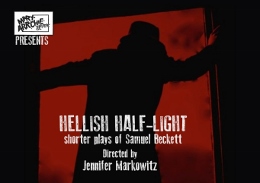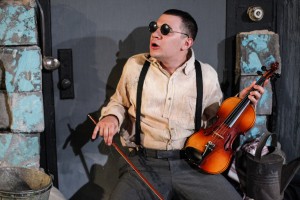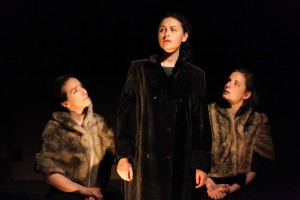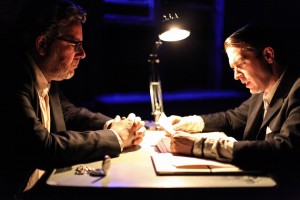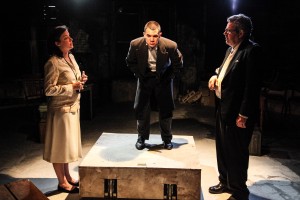SAMUEL BECKETT: MINIMALISM IN EXTREMIS
Dark doings on a claustrophobic stage. These are the 80+ minutes at Mary-Arrchie Theatre’s Angel Island. Six short but not sweet offerings by the late Samuel Beckett create their own Hellish Half-Light. Audience members are scattered about the appropriately minimalist playground, a stark home for Jennifer Markowitz’ awesomely disciplined and occasionally compelling showcase. Unavoidably, given this demanding playwright’s arid offerings, the result is effort over entertainment. It’s a glimpse of the void interrupted by speech. Alas, sometimes less is just that.
The harsh evening opens with “Rough for Theatre I.” Two bums at a street corner recall vaudevillian vagrants Vladimir and Estragon in Waiting for Godot. A and B (their reductionist names) poignantly try to hold onto their humanity in a post-everything world. A blind fiddling beggar (Rudy Galvan) vaguely engages with a barking interrogator in a wheelchair (Stephen Walker). The lonely latter asks a Beckett-bleak question, “Why don’t you let yourself die?” Indeed. Paralyzed and blind, these broken men combine to become one.
“Rough for Theatre II,” the most esoteric of these theatrical thickets, depicts two self-importantly officious bureaucrats (Walker and Adam Soule). Engrossed in a closed commentary full of desultory observations, they debate the destiny of a forlorn man (Galvan) standing at a window, about to jump. Alternately mumbling, whispering or screaming, they get lost in their paperwork, frustrated by a desk lamp that inexplicably keeps turning off. Nothing happens—which, of course, is Beckett in full action. “We’re getting nowhere” says it all.
Simplest and slyest, “Come & Go” assembles three mysterious female friends in mink stoles on a rugged bench (Kathrynne Wolf, Lauren Guglielmello, Molly Fisher). These indulge in gallows gossip and ritualistic repetition: Whenever one walks away, each hints to the remaining other at a toxic secret concerning the undearly departed. The Beckettian dialogue festers with empty nostalgia.
“Catastrophe” delivers a sardonic look at the actor as clay to be molded. An imperious stage director (Walker) snaps arbitrary orders at the female assistant (Fisher). She then manipulates a mute thespian on a platform (Galvan). The title refers to the climax of a play, a supposedly spontaneous crisis that these fussy, arrogant artists are ironically shaping to the last detail.
The energy doubles in “What Where,” a frenzied sketch in which Bam, Bom, Bim and Bem (Wolf, Soule, Galvan, Fisher) rush about trying to recreate a memory (with the “where” component eluding them altogether). The stage direction “Time passes” belies itself: Nothing finds completion. “I switch off” ends the impasse.
Finally, “Play,” the most daunting discovery, features a man, his wife and a mistress (Galvan, Wolf, and Guglielmello) enclosed in urns (no garbage cans in this one!). Declaiming from the grave, they erupt in rapid-fire reminiscences of betrayal, forgiveness and more treachery. A fierce and unrelenting “endgame,” they rage against the “hellish half-light” that plagues them as it triggers their manic, machine-gun confessions. No question, it’s a technical tour-de-force: Tyler Garlock’s light cues are perfectly synched with the actors’ pile-driving, barely comprehensible testimony. “Play” perfectly proves that with Beckett tone is as important as content.
Hellish Half-Light: Shorter Plays of Samuel Beckett is mainly, if not only, for those who know the longer plays. There’s no context for these hit-and-run dramatic detonations. Maddeningly, they exist to vanish. Beckett wants to see how close theater can come to the silence of death without disappearing altogether. He sadly succeeds.
photos by Emily Schwartz
HELLISH HALF-LIGHT: Shorter Plays of Samuel Beckett
Mary-Arrchie Theatre Co.
Angel Island, 731 W. Sheridan Rd.
Thurs-Sat at 7:30; Sun at 2:00
scheduled to end on August 30, 2014
for tickets, call 773.871.0442 or visit www.ticketweb.com
for more info, visit www.maryarrchie.com
